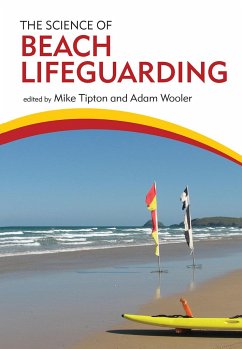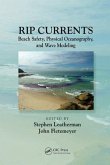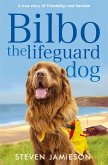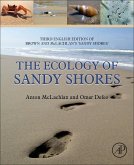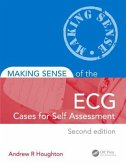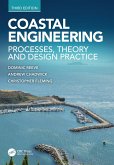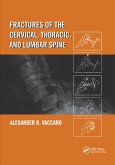The Science of Beach Lifeguarding
Herausgeber: Tipton, Mike; Wooler, Adam
The Science of Beach Lifeguarding
Herausgeber: Tipton, Mike; Wooler, Adam
- Broschiertes Buch
- Merkliste
- Auf die Merkliste
- Bewerten Bewerten
- Teilen
- Produkt teilen
- Produkterinnerung
- Produkterinnerung
Written by leading researchers, academics, and lifeguard practitioners, The Science of Beach Lifeguarding focuses on the scientific evidence that underpins beach lifeguarding. It is the first book to pull together all the different areas involved in beach lifeguarding and evaluate their evidence base. The book covers the context of beach
Andere Kunden interessierten sich auch für
![Rip Currents Rip Currents]() Rip Currents99,99 €
Rip Currents99,99 €![Bilbo the Lifeguard Dog Bilbo the Lifeguard Dog]() Steven JamiesonBilbo the Lifeguard Dog17,99 €
Steven JamiesonBilbo the Lifeguard Dog17,99 €![The Ecology of Sandy Shores The Ecology of Sandy Shores]() Anton McLachlanThe Ecology of Sandy Shores123,99 €
Anton McLachlanThe Ecology of Sandy Shores123,99 €![Making Sense of the Ecg: Cases for Self Assessment Making Sense of the Ecg: Cases for Self Assessment]() Andrew HoughtonMaking Sense of the Ecg: Cases for Self Assessment42,99 €
Andrew HoughtonMaking Sense of the Ecg: Cases for Self Assessment42,99 €![Coastal Engineering Coastal Engineering]() Dominic Reeve (UK University of Swansea)Coastal Engineering84,99 €
Dominic Reeve (UK University of Swansea)Coastal Engineering84,99 €![Fractures of the Cervical, Thoracic, and Lumbar Spine Fractures of the Cervical, Thoracic, and Lumbar Spine]() Alexander R. VaccaroFractures of the Cervical, Thoracic, and Lumbar Spine84,99 €
Alexander R. VaccaroFractures of the Cervical, Thoracic, and Lumbar Spine84,99 €![Making Sense of the ECG Making Sense of the ECG]() Andrew Houghton (United Lincolnshire Hospi Consultant CardiologistMaking Sense of the ECG35,99 €
Andrew Houghton (United Lincolnshire Hospi Consultant CardiologistMaking Sense of the ECG35,99 €-
-
-
Written by leading researchers, academics, and lifeguard practitioners, The Science of Beach Lifeguarding focuses on the scientific evidence that underpins beach lifeguarding. It is the first book to pull together all the different areas involved in beach lifeguarding and evaluate their evidence base. The book covers the context of beach
Hinweis: Dieser Artikel kann nur an eine deutsche Lieferadresse ausgeliefert werden.
Hinweis: Dieser Artikel kann nur an eine deutsche Lieferadresse ausgeliefert werden.
Produktdetails
- Produktdetails
- Verlag: Taylor & Francis Ltd
- Seitenzahl: 312
- Erscheinungstermin: 31. März 2021
- Englisch
- Abmessung: 254mm x 178mm x 17mm
- Gewicht: 574g
- ISBN-13: 9780367787691
- ISBN-10: 0367787695
- Artikelnr.: 61210783
- Herstellerkennzeichnung
- Libri GmbH
- Europaallee 1
- 36244 Bad Hersfeld
- gpsr@libri.de
- Verlag: Taylor & Francis Ltd
- Seitenzahl: 312
- Erscheinungstermin: 31. März 2021
- Englisch
- Abmessung: 254mm x 178mm x 17mm
- Gewicht: 574g
- ISBN-13: 9780367787691
- ISBN-10: 0367787695
- Artikelnr.: 61210783
- Herstellerkennzeichnung
- Libri GmbH
- Europaallee 1
- 36244 Bad Hersfeld
- gpsr@libri.de
Edited by: Mike Tipton, professor, Human & Applied Physiology, Extreme Environments Laboratory, Department of Sport & Exercise Science, University of Portsmouth, UK. Educated at the Universities of Keele and London, professor Tipton joined the University of Surrey in 1986. After 12 years at the Robens Institute and European Institute of Health and Medical Science he moved to the University of Portsmouth in 1998. In addition to his university positions, professor Tipton was based at the Institute of Naval Medicine (INM) from 1983 to 2004 and was Consultant Head of the Environmental Medicine Division of the INM from 1996. He has spent over 30 years researching and advising the military, industry and elite sports people in the areas of thermoregulation, environmental and occupational physiology and survival in the sea. He has published 500 scientific papers, reports, chapters and books in these areas. Professor Tipton was a consultant in survival and thermal medicine to the Royal Air Force and UKSport. He sits on the Royal National Lifeboat Institution's Medical & Survival Committee, and the Ectodermal Dysplasia Society's medical advisory board. In 2004, professor Tipton was made an Honorary Life Member of the International Association for Safety & Survival Training in recognition of his work in sea survival. He chaired UKSport's Research Advisory Group and now sits on the English Institute of Sports' Technical Advisory Group. Professor Tipton chairs the Energy Institute's Health Technical Committee; he is a Trustee of Surf Lifesaving GB and Senior Editor of the journal "Extreme Physiology and Medicine." Professor Tipton is a Fellow of the Royal Society of Medicine, he provides advice to a range of universities, government departments, industries, medical, search and rescue and media organisations. Adam Wooler, director, Rescue Marine Services Ltd; former head of Lifeguarding, Royal National Lifeboat Institution, UK; and chief executive, Surf Life Saving Great Britain, UK. Adam has considerable experience and expertise in lifeguarding, having instigated the establishment of the Royal National Lifeboat Institution's Lifeguard service, as well as a background in academic research. He earned an MPhil from the University of Plymouth, Scott Polar Research Institute, Cambridge University and Atlantic Geoscience Centre, Nova Scotia Canada. Following the award of a Rotary Scholarship to New Zealand and the Antarctic, Adam completed extensive research at the Universities of Wellington in New Zeland and Perth, Western Australia before returning to become the chief executive of Surf Life Saving GB. After a move to the RNLI in 2000, Adam instigated a partnership with the Universities of Portsmouth and Plymouth to conduct ground-breaking research into the field of beach lifeguarding. Following a further three-year secondment as CEO of Surf Life Saving GB, Adam returned to the RNLI as Head of Coastal Safety & Research establishing the Operations Research Unit. Although Adam left the RNLI in 2012 he continues to act as an external supervisor for PhD students at the University of Plymouth and has co-authored several papers on lifeguard-related research.
Context
History of Beach Lifeguarding
Lifeguard Effectiveness
Data
Risk Analysis and Evaluation
Modern Day Beach Lifeguarding Practice
Physical Environment
Beach Hazard Identification
Rip Currents
Beach Risk Assessment
Risk Assessment in Practice
Human Environment
Drowning
Cold Water Immersion
Human Environment: Implications for Practice
Lifeguarding
Recognition
Vigilance and Surveillance Techniques
Lifeguard Swimming Performance in Surf
Resuscitation Techniques for Lifeguards
Beach Lifeguard First Aid
Effectiveness of Beach Lifesaving Techniques
Effectiveness of Beach Lifesaving Equipment
Technological Advantages in Beach Safety and Lifeguarding
Lifeguarding Practice: Recent Advances
Lifeguard Standards
Injuries and Risks whilst Lifeguarding
Medical Standards
Eyesight Standards
Occupational Fitness and Strength Standards
The importance and Implications of Lifeguard standards
Safety Education
A Behavioural Approach to Safety Education
Beach Safety Prevention Strategies
Effectiveness of Beach Safety Educational Programmes
Safety Education in Practice
History of Beach Lifeguarding
Lifeguard Effectiveness
Data
Risk Analysis and Evaluation
Modern Day Beach Lifeguarding Practice
Physical Environment
Beach Hazard Identification
Rip Currents
Beach Risk Assessment
Risk Assessment in Practice
Human Environment
Drowning
Cold Water Immersion
Human Environment: Implications for Practice
Lifeguarding
Recognition
Vigilance and Surveillance Techniques
Lifeguard Swimming Performance in Surf
Resuscitation Techniques for Lifeguards
Beach Lifeguard First Aid
Effectiveness of Beach Lifesaving Techniques
Effectiveness of Beach Lifesaving Equipment
Technological Advantages in Beach Safety and Lifeguarding
Lifeguarding Practice: Recent Advances
Lifeguard Standards
Injuries and Risks whilst Lifeguarding
Medical Standards
Eyesight Standards
Occupational Fitness and Strength Standards
The importance and Implications of Lifeguard standards
Safety Education
A Behavioural Approach to Safety Education
Beach Safety Prevention Strategies
Effectiveness of Beach Safety Educational Programmes
Safety Education in Practice
Context
History of Beach Lifeguarding
Lifeguard Effectiveness
Data
Risk Analysis and Evaluation
Modern Day Beach Lifeguarding Practice
Physical Environment
Beach Hazard Identification
Rip Currents
Beach Risk Assessment
Risk Assessment in Practice
Human Environment
Drowning
Cold Water Immersion
Human Environment: Implications for Practice
Lifeguarding
Recognition
Vigilance and Surveillance Techniques
Lifeguard Swimming Performance in Surf
Resuscitation Techniques for Lifeguards
Beach Lifeguard First Aid
Effectiveness of Beach Lifesaving Techniques
Effectiveness of Beach Lifesaving Equipment
Technological Advantages in Beach Safety and Lifeguarding
Lifeguarding Practice: Recent Advances
Lifeguard Standards
Injuries and Risks whilst Lifeguarding
Medical Standards
Eyesight Standards
Occupational Fitness and Strength Standards
The importance and Implications of Lifeguard standards
Safety Education
A Behavioural Approach to Safety Education
Beach Safety Prevention Strategies
Effectiveness of Beach Safety Educational Programmes
Safety Education in Practice
History of Beach Lifeguarding
Lifeguard Effectiveness
Data
Risk Analysis and Evaluation
Modern Day Beach Lifeguarding Practice
Physical Environment
Beach Hazard Identification
Rip Currents
Beach Risk Assessment
Risk Assessment in Practice
Human Environment
Drowning
Cold Water Immersion
Human Environment: Implications for Practice
Lifeguarding
Recognition
Vigilance and Surveillance Techniques
Lifeguard Swimming Performance in Surf
Resuscitation Techniques for Lifeguards
Beach Lifeguard First Aid
Effectiveness of Beach Lifesaving Techniques
Effectiveness of Beach Lifesaving Equipment
Technological Advantages in Beach Safety and Lifeguarding
Lifeguarding Practice: Recent Advances
Lifeguard Standards
Injuries and Risks whilst Lifeguarding
Medical Standards
Eyesight Standards
Occupational Fitness and Strength Standards
The importance and Implications of Lifeguard standards
Safety Education
A Behavioural Approach to Safety Education
Beach Safety Prevention Strategies
Effectiveness of Beach Safety Educational Programmes
Safety Education in Practice

